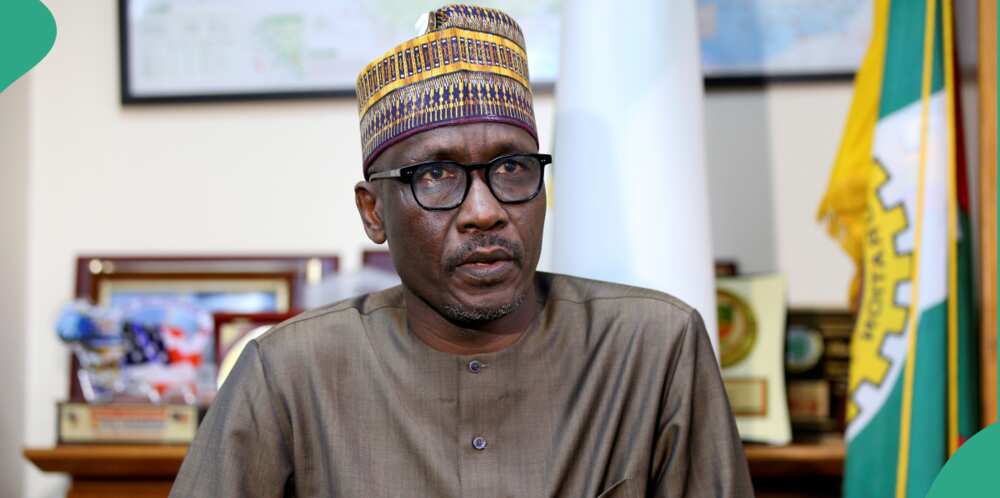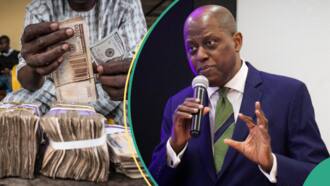NNPC Finally Explains Why It Borrowed N3.3bn to Pay Back With $12bn Worth of Oil
- The Nigerian National Petroleum Company Limited has provided a detailed explanation of the controversial $3.3 billion crude oil pre-payment loan
- It disclosed that the projects the money would be utilized on would eventually help to ensure the availability of dollars in the country
- It said the funds were used in potential resources to increase exports that would bring in more foreign exchange and dollars
PAY ATTENTION: The 2024 Business Leaders Awards Present Entrepreneurs that Change Nigeria for the Better. Check out their Stories!
Legit.ng journalist Zainab Iwayemi has over three years of experience covering the Economy, Technology, and Capital Market.
The Nigerian National Petroleum Company Limited (NNPCL) has explained the controversial $3.3 billion crude oil pre-payment loan it signed with the African Export-Import Bank (Afreximbank) in 2023.

Source: UGC
Femi Soneye, the chief corporate communications officer of NNPCL, disclosed this in an interview with journalists.
He said the 'Project Gazelle' deal was ultimately geared to provide dollar financing to the federal government.
PAY ATTENTION: Click “See First” under the “Following” tab to see Legit.ng News on your Facebook News Feed!
Prior to the NNPCL deal
In August, NNPCL announced that it secured a $3 billion emergency loan from Afreximbank to stabilize the country's volatile foreign exchange market.
This deal followed a $5 billion corporate finance commitment over a year ago from the same Afreximbank to fund significant investments in Nigeria's upstream sector.
Out of the $3.3 billion facility from the multilateral financial institution, the federal government, in late December 2023, announced receipt of $2.25 billion.
The principal arranger of the loan is Afreximbank, with other sub-lenders including VITOL, Sahara Energy Group, Oando, Guvnor, one of the biggest energy trading houses in the world by turnover, and the United Bank for Africa (UBA), which contributed $100 million.

Read also
CBN pays 14 banks’ FX backlog in bold move to strengthen the naira, set to pay foreign airlines
Questions about the deal
The reactions of Nigerians to the loan were mixed, particularly regarding worries about how the facility would affect Nigeria's oil production.
TheCable reported that Nigeria would pay an interest of 11.85% per annum on the N3.3 billion pre-export finance facility facilitated by the NNPC Ltd
The news agency said the deal garnered significant interest as the NNPC had pledged over $12 billion of oil - about three times more than the facility had taken.
To make repayment, the NNPC will forward-sell 90,000 barrels per day of Nigeria's share of offshore crude oil under the production-sharing contract with the oil companies.
NNPC defends deal
According to the NNPCL spokesman in an Arise News report, the loan was required as a short-to-medium-term fix for the nation's present foreign exchange deficit issue.
He mentioned that as of June 2023, the Central Bank of Nigeria (CBN) had approximately $6 billion in outstanding forward contracts with non-party institutions.
Soneye said these unmet obligations pressured the nation's external reserves and significantly devalued the naira.
He clarified that the agreement's goal was for NNPC Ltd to eventually give the federal government dollar financing.
He added that the pre-financing arrangement allows the federal government to receive foreign exchange in advance to enable it to resolve its unmet FX obligations.
How the funding is utilized
According to the NNPCL spokesman, the available funds are invested in current and potential resources.
He also mentioned that as new projects come online, there may be an increase in the nation's production of oil and gas as well as an increase in commodity exports, which would bring in more foreign exchange and dollars.
He also said that foreign banks have a history of offering forward-sale financing, which attracts fresh foreign direct investments (FDIs) to the nation.
Soneye stated that some of Nigeria's prospective reserves, which have over 35 billion barrels of proven reserves that need to be produced and exploited, may be used to acquire the necessary funds.

Read also
ABCON finally exposes reasons behind naira depreciation as CBN moves against Forex defaulters
He pointed out the nation might securitize these proven oil reserves using forward sale finance, which will improve foreign exchange inflows immediately rather than waiting years.
He said:
“When exports finally start, the forward-sale investments are repaid using the money earned from those same exports. This improves the country’s balance of payments.
“The financing gives the government more stable and predictable oil earnings. This helps in planning budgets and managing foreign exchange reserves.”
Dangote Refinery set to supply 150,000 fuel stations
Legit.ng reported that Dangote Petroleum Refinery's plan to supply about 150,000 retail outlets operated by the Independent Petroleum Marketers Association of Nigeria (IPMAN).
This followed an agreement reached between the refinery's management and IPMAN executives.
The meeting was held to discuss the supply of products to independent marketers.
Legit.ng also reported how $2.25 billion NNPC loan to banks would help boost the naira.
PAY ATTENTION: Unlock the best of Legit.ng on Pinterest! Subscribe now and get your daily inspiration!
Source: Legit.ng


